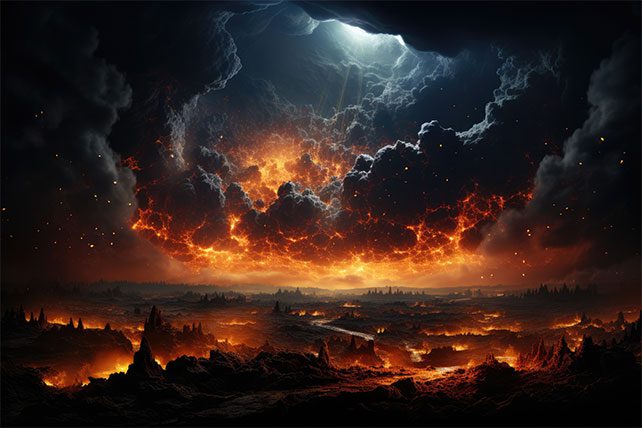Armageddon, deeply embedded within the Christian eschatological framework, represents not just a prophesied physical location for a climactic battle but also encompasses profound theological and spiritual dimensions. This exploration delves into its scriptural underpinnings, symbolisms, and the varying interpretations that illuminate its significance within biblical prophecy.
Biblical Context of Armageddon
Megiddo, an ancient city, was strategically positioned at the crossroads of major trade routes in the Levant, making it a site of significant economic and military importance throughout history. Its association with numerous historical battles likely contributed to its symbolic selection as the site for the prophesied final battle between good and evil.
RELATED: Characteristics of Prayer in the End Times
The primary reference to Armageddon is found in the Book of Revelation (Revelation 16:16), where it is depicted as the site of the final battle between the forces of good, led by God, and the forces of evil. This prophetic vision offers a symbolic narrative, rich with apocalyptic themes, reflecting the ultimate confrontation between divine and satanic powers.
Armageddon in the New Testament
The Book of Revelation in the New Testament introduces Armageddon as the location for the ultimate confrontation between the forces of good, led by God, and the forces of evil, comprising earthly kings under demonic influence. This eschatological battle symbolizes the end times, where divine justice prevails over human rebellion and sin.
Symbolism of the Final Battle
Armageddon, more than just a geographical location, represents the culmination of the cosmic struggle between divine authority and human governance. It embodies the apocalyptic vision where the fundamental moral and spiritual conflicts of humanity are resolved.
Eschatological Perspectives
The interpretation of Armageddon varies significantly across different eschatological viewpoints:
- Premillennialism views Armageddon as a literal battle preceding Christ’s thousand-year reign on earth.
- Postmillennialism interprets it as the period of Christian dominion leading to Christ’s return, often emphasizing a symbolic battle.
- Amillennialism generally understands Armageddon as an ongoing spiritual struggle, culminating in Christ’s ultimate victory over evil without a specific earthly millennium.
Theological Interpretations
Armageddon is interpreted in various theological perspectives as the definitive clash between good and evil. It signifies the moment when human institutions, often seen as opposed to divine will, face judgment. This confrontation is not just a physical battle but a spiritual and moral reckoning, reflecting the ultimate triumph of divine authority.
Different Christian denominations interpret Armageddon in diverse ways, ranging from a literal battlefield to a symbolic representation of spiritual warfare. The interpretation often hinges on broader eschatological views within each tradition, influencing the perceived timeline and nature of end-time events.

